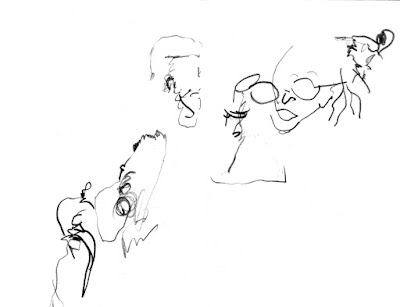London Jazz News – 16 December 2017
REVIEW: Elaine Mitchener, Moor Mother, Philip Corner at the 2017 LCMF
Geoff Winston
“They rose to the challenge with an impressive, tactile take on key compositions which blended activism with the avante-garde, highlighting bonds between jazz and poetry.”
Central to the evening were the demands of six Vocal Classics of the Black Avant-Garde from the ’60s and ’70s, in a programme devised by vocalist Elaine Mitchener in the company of luminaries from the British jazz scene, Byron Wallen (trumpet and flute), Robert Mitchell (piano), Neil Charles (bass), Mark Sanders (drums) and London-based American poet, Dante Micheaux, with saxophonist Jason Yarde taking on the role of Musical Director. They rose to the challenge with an impressive, tactile take on key compositions which blended activism with the avante-garde, highlighting bonds between jazz and poetry.
Jeanne Lee linked jazz vocalising with Fluxus art and Happenings in the early 60s. Yarde’s claps and Wallen’s conch shell echoes fixed the co-ordinates for Lee’s The Capacity of this Room giving way for Mitchener to follow through with its lightly humorous lyrics and bursts of serrated calls, and Mitchell and Sanders powering through its final stages with percussive gusto. Willem Breuker was on the original recording with the Gunter Hampel Group (Hampel and Lee were married) so the bar was set high.
Archie Shepp’s On this Night (If that Great Day Would Come) cuts deep in his tribute to Marxist campaigner W. E. B. DuBois, anticipating his angry Scag several years later, with Mitchener sensitively reinterpreting the original vocal recording by opera singer, Christine Stevens. With stark imagery slicing through – ‘Behold the blood from my brother’s veins …’ – Yarde soloed tight with Wallen’s flute and within the space crafted by Charles’s bass as the group took on Shepp’s rich ebb and flow with Sanders, throughout the set, a lightly stated fulcrum in the backgrounding to Mitchener’s vocal invention.
Lee’s In These Last Days, written in ’73 and recorded in ’79, also took on a darker, more operatic tone. Sanders’ brush work and Wallen’s mini explosions set the scene ‘… of Total / Dis-in-te-gra-tion where every day / Is a struggle against becoming / An object in someone else’s nightmare …’ Discomfort was bedding in. The deeper, broader picture was being sketched out further.
The focus on the word became more acute as Micheaux took on the diction of Joseph Jarman’s delivery in the key, early AACM work of ’67, the poem, Non-Cognitive Aspects of the City, pacing the flow with precision, weighting and balancing each word and phrase. The reference to European Dada, ‘new word out of the twenties of chaos’, crossed with the ambiguity of ‘exit the tenderness for power / black or white / no difference now’, and to drive home the reality, ‘The church pronouncing the hell of where we are’, in a sensitive rendition which didn’t allow any of the text an easy escape route.
Jim Crow, initially ascribed to Eric Dolphy, is a Bob James composition, originally entitled A Personal Statement with the composer’s ex-classmate, counter-tenor David Schwartz, providing the strained, operatic vocals in the quintet which included Dolphy, whom James admired and was able to enlist, in the powerful recording which appears on the Dolphy album, Other Aspects. Yarde added his own voice with buffeting sax while Mitchener brought her own punchy clarity to the quasi-classical feel of the piece.
Les McCann, best known as a hefty keyboard player, wrote Compared To What as a sharp, satirical look at hypocrisy, injustice and the Vietnam War in a steaming, funky setting. ‘Trying to make it real – compared to what?’ Charles kicked off with infectious bass lines with Mitchener putting her stamp on the project’s set with a high-energy, ecstatic vocal finale.
 |
| Elaine Mitchener performing ‘On This Night (If That Great Day Would Come)’ at LCMF 2017 Drawing by Geoff Winston. © 2017. All Rights Reserved |
